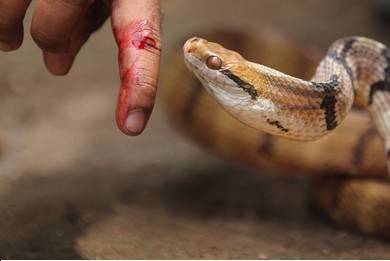In Case of Snake Bite: 9 Immediate Actions to Save Your Life
Introduction:
Encountering a snake and getting bitten can be a terrifying experience, but it's essential to stay calm and take immediate action. Knowing what to do in such a situation can potentially save your life. Here are nine crucial steps to follow if you or someone around you is bitten by a snake.
1. Stay Calm:
Panicking can elevate your heart rate and spread the venom more quickly through your body. Take a deep breath and try to stay as calm as possible. Remember that most snake bites, although alarming, are not fatal if treated promptly.
2. Seek Safety:
Move away from the snake to prevent further bites. Ensure that you and the victim are out of the snake's striking range. Keep others at a safe distance as well.
3. Call for Help:
Contact emergency services immediately or ask someone nearby to do so. Inform them about the snake bite and provide your location accurately. Professional medical assistance is crucial in snake bite cases.
4. Immobilize the Affected Area:
Keep the bitten area as still as possible, preferably at or below heart level. Immobilizing the limb or body part can help slow down the venom's spread throughout the body, reducing its impact.
5. Remove Constrictive Items:
If there are any constrictive items like jewelry or tight clothing near the bitten area, remove them promptly. Swelling may occur, and it's important to prevent constriction that could further worsen the situation.
6. Clean the Wound:
Gently wash the bite wound with mild soap and water. Avoid using harsh chemicals or substances as they may cause additional damage. Cleaning the wound can help minimize the risk of infection.
7. Apply a Clean Bandage:
Once the wound is clean, cover it with a sterile bandage or cloth. Ensure the bandage is not wrapped too tightly, as it should be snug but not restrict blood flow. This will help protect the wound and prevent further contamination.
8. Keep Still and Monitor Vital Signs:
Encourage the victim to stay as still as possible while waiting for medical help to arrive. Monitor their vital signs, including breathing rate, heart rate, and blood pressure. Note any changes and inform the medical professionals upon their arrival.
9. Do Not:
Avoid taking certain actions that could potentially worsen the situation:
- Do not suck out the venom: This method is ineffective and may increase the risk of infection.
- Do not apply a tourniquet: Tourniquets can cut off blood circulation and cause severe damage.
- Do not use ice or cold packs: These can increase tissue damage and enhance venom absorption.
Conclusion:
Remember, snake bites are relatively rare, and most snakes are non-venomous. However, it's crucial to be prepared and aware of the appropriate steps to take if a snake bite does occur. By staying calm, seeking immediate medical help, and following the recommended actions, you can significantly improve your chances of a successful recovery.




No comments yet
Be the first to share your thoughts!